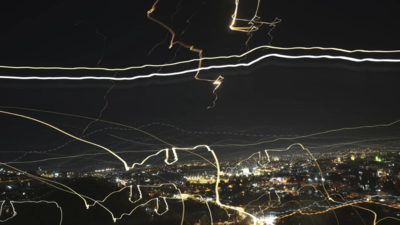
Missiles over Israel in retaliatory attack by Iran (Image credit: AP)
The Middle East has been thrust into one of its most volatile moments in recent history, as Israel and Iran exchanged direct strikes over the past three days, targeting each other’s most sensitive military and nuclear facilities.In Israel, air raid sirens echoed through the Sunday morning hours as explosions rocked cities like Jerusalem and Tel Aviv, forcing millions to seek shelter. At least eight people, including children, were killed and around 200 wounded in Iran’s overnight missile barrage.
Meanwhile, in Tehran, a series of blasts—reportedly from Israeli strikes targeting the defence ministry—shattered the night, with smoke and rubble marking the aftermath. The escalating tit-for-tat attacks, now in their third day, have derailed nuclear negotiations between Iran and the US and stoked fears of a wider regional war, as global appeals for de-escalation go unheeded.
How it all started?
In the early hours of Friday, Israel launched a wave of missile strikes deep into Iranian territory, striking nuclear and military installations in what Israeli Prime Minister Benjamin Netanyahu described as an effort to stop Tehran from reaching the “point of no return” in its nuclear programme.
A major target was Iran’s Natanz nuclear facility, a heavily fortified underground site. Though Iran claimed limited damage and said radiation levels remained stable, the scope of the attack was broad — with additional hits reported at the Fordo and Isfahan sites. The Israeli military said it had targeted more than 200 locations across Iran, including air bases and missile infrastructure. Commanders from Iran’s Revolutionary Guards, including aerospace chief Amirali Hajizadeh, were among dozens reportedly killed in the strikes.
Iran’s UN ambassador said 78 people had died and over 320 were wounded in the initial wave.
How Iran retaliated?
Labeling the Israeli strikes a “declaration of war,” Iran retaliated with barrages of missles. On Friday night and into Saturday, it launched dozens of missiles and explosive drones at Israeli cities, including Tel Aviv and the coastal region of Gush Dan. Air raid sirens blared across the country as Israelis scrambled for shelters.
Iran’s attacks reportedly killed at least eight civilians, including women and a 10-year-old boy, and injured over 130. Israeli officials said most of the drones were intercepted before reaching Israeli airspace, but several missiles struck populated areas. Iran also signaled readiness to continue its retaliation, warning of further action if Israeli attacks persisted.
Global powers call for de-escalation
The escalating conflict has set off alarm bells globally.
The United Nations Security Council convened an emergency session on Friday. UN secretary general António Guterres urged both sides to stand down, calling for “peace and diplomacy to prevail.” The US, though informed in advance of Israel’s operation, has denied any direct involvement. US President Donald Trump warned Iran that future planned attacks would be "even more brutal," urging Tehran to return to negotiations over its nuclear programme.
Meanwhile, the scheduled nuclear talks between Iran and the US, which were to take place Sunday in Oman, have now been cancelled.Prime Minister Narendra Modi also urged for peace saying, "Received a phone call from PM @netanyahu of Israel. He briefed me on the evolving situation. I shared India's concerns and emphasized the need for early restoration of peace and stability in the region."
How has it impacted the region?
Several Middle Eastern countries — including Iran, Iraq, Jordan, and Syria — closed their airspace, while major airlines suspended flights through the region. Oil prices spiked sharply amid concerns over disruptions to the Strait of Hormuz, a vital chokepoint for 20% of global crude oil shipments. While the UN nuclear watchdog reported no immediate risk of radiation leaks, it is calling for an emergency meeting on Monday to assess the broader implications.

 13 hours ago
44
13 hours ago
44




























 English (US)
English (US)